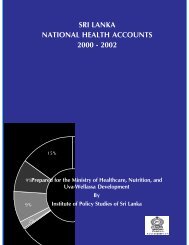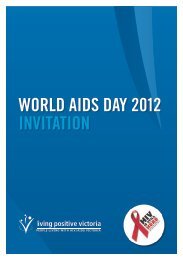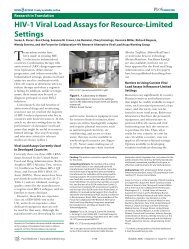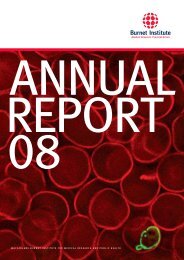Download - Burnet Institute
Download - Burnet Institute
Download - Burnet Institute
You also want an ePaper? Increase the reach of your titles
YUMPU automatically turns print PDFs into web optimized ePapers that Google loves.
PUBLIC HEALTHPEOPLE WHO INJECT DRUGS ARE ATMUCH HIGHER RISK OF INFECTION WITHHEPATITIS VIRUSES THAN THE REST OFTHE AUSTRALIAN POPULATION.HEPATITIS BNational surveillance data indicate that 50 per cent of allnew hepatitis B infections occur in people who inject drugs.Without appropriate treatment, 25 per cent of peoplewith chronic hepatitis B will die from liver cancer orliver failure.HEPATITIS CChronic hepatitis C is most often acquired throughinjecting drug use, and the disease is now the mostcommon indication for a liver transplant.Hepatitis C infection can be treated, but treatment isdebilitating and not always successful. No preventativevaccine exists but <strong>Burnet</strong>’s Associate Professor HeidiDrummer and others are making great strides towardsthis goal.REACHING OUT:WORKING WITHMELBOURNE’S MOSTVULNERABLESUPPORT BURNET’S MOBILE OUTREACH<strong>Burnet</strong>’s vans are essential to our outreach work;they enable us to cover large distances acrossmetropolitan Melbourne, and are great platforms forresearch and delivering services. Our second van isnearing the end of its useful life, and we need fundsfor a replacement. For information on how to help usobtain this vital piece of equipment, please contactProfessor Paul Dietze on (03) 9282 2111.Research participants are interviewed about sensitivebehaviours such as sex and drug use.10 IMPACT Summer 2012Outreach – meaningengaging people in theirown environments, ontheir own terms, to helpthem improve their healthand well-being – hasbeen a major feature ofthe <strong>Burnet</strong> <strong>Institute</strong>’sepidemiological researchprogram for more thantwo decades.HIGHLY VULNERABLEAUSTRALIANSPeople who inject drugs areamong the most vulnerableand marginalised Australians.Compared with the rest of thepopulation, they experiencehigher rates of incarceration,poverty, homelessness, ill-health,educational disadvantage,unemployment, violenceand sexual abuse, socialdisconnectedness, and familybreakup. Head of <strong>Burnet</strong>’s Centrefor Population Health, ProfessorMargaret Hellard points out thatusing illicit drugs such as heroinor methamphetamines can be asmuch a response to these social,health and economic problems asa cause of them.“The poor health statusof people who injectdrugs is one of <strong>Burnet</strong>’skey research priorities,especially their riskof drug overdose andexposure to infectiousdiseases such ashepatitis B and C,”Professor Hellard said.OUTREACH ANDRESEARCHThe <strong>Burnet</strong>’s Centre for PopulationHealth works with vulnerablepeople in Melbourne andelsewhere in Victoria throughseveral field-based researchprojects. The largest of theseprojects is the Melbourne InjectingDrug Users Cohort Study (MIX).









